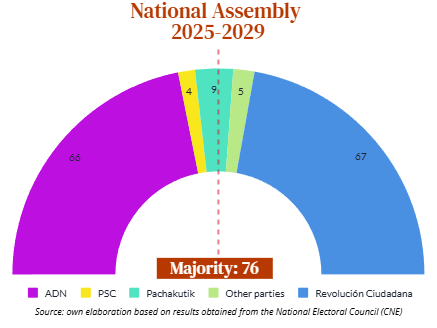With re-election secured, Noboa looks to consolidate political authority

On April 13, President Daniel Noboa Azín was re-elected for the 2025–2029 term after winning the runoff with 55.65% of the vote, defeating correísta candidate Luisa González from the Revolución Ciudadana movement, who obtained 44.35%. Noboa will begin his second term on May 24 with strengthened political capital, though still lacking a legislative majority to set the agenda on his own.
The correísta opposition has sought to discredit the process by alleging irregularities, but so far these claims have remained rhetorical. In this context, Noboa’s main challenge will not be retaining popular support, but turning it into effective governance.
To do so, he will need to build congressional alliances, avoid political isolation, and sustain a coherent reform agenda that responds to the country’s pressing needs and sets the tone for his second term.
Noboa had a 10-point lead over González
Voter turnout exceeded 83%, signaling an engaged but divided electorate. Daniel Noboa turned the tide after the first round and beat the polls, securing 55.65% of the vote over Luisa González’s 44.35%.
In just two months, Noboa gained nearly a million new votes, flipping the outcome in five key provinces and expanding his territorial reach. One of the most striking gains came in Cotopaxi, where his support jumped by 25%, reinforcing a strategically grounded and geographically broad victory.
What lies ahead for President Noboa’s second term?

Daniel Noboa’s re-election opens a new political chapter, one marked by both promising opportunities and underlying risks. While his legitimacy remains solid for now, it could quickly weaken if he’s unable to deliver effective responses—backed by the Assembly—to pressing issues such as public security, job creation, and the country’s fiscal crisis. The main challenge will be to secure governability and transform his movement into an organized political force.
As of May 14, the ruling party will face a fragmented Assembly with no clear majority. To pass legislation, it will need to form alliances with actors such as Pachakutik and the Partido Social Cristiano (PSC) to reach the 76 votes required. Success will hinge on a strong negotiating strategy and the ability to build consensus across ideological divides.
The real test lies in moving past a reactive approach and toward strategic governance—crafting a reform agenda that resonates with social demands and garners parliamentary support to tackle Ecuador’s structural challenges.
